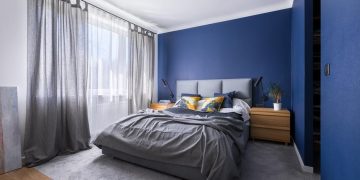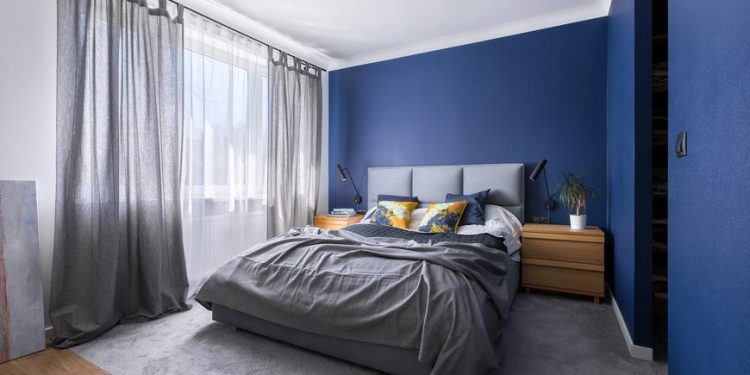When it comes to bedroom design, many people focus on elements that reflect their needs when they’re awake.
Clothes on the chair? Easier to grab in the morning. Cluttered furniture? You need your bed, desk, dresser, and chair. Overflowing laundry hamper? With everything you have to do, laundry is pretty low on your priority list.
You also keep your computer and phone close at hand, since you never know when you might need them. You try to avoid looking at them after you turn off the lights, but your resolve doesn’t always stick especially when you have trouble falling asleep.
Your bedroom might offer convenience by day, but there’s a chance it has a different impact at night. Even if all you do is sleep in your bedroom, you still spend about a third of each day there. A hot, bright, cluttered room can disrupt your sleep and keep you lying awake for a chunk of this time, which can mean bad news for your waking health.
We’ve put together nine of the best ways you can enhance your space for sleep according to leading sleep hygiene experts and recent studies. Read on to learn what environmental changes can have the biggest impact on rest.
1. Cool it Off
Ever feel too hot or sweaty to sleep? It’s not in your head; warmer temperatures do really affect sleep quality. The optimal temperature range for rest according to most sleep experts is somewhere in the range of 60 to 72 degrees Fahrenheit.
If you don’t want to leave the air conditioning on blast all night, you could go the greener route of installing a ceiling fan, using an electric fan, or opening windows when nighttime temperatures are cool. Cooling mattress pads and lighter weight bedding can also help.
Try different thermostat settings to see what feels most comfortable to you, as each person will vary. If you are a furnace and your partner is left shivering, it may also be helpful to use different comforter weights so you can both sleep optimally.
2.Keep it Dark
According to studies, exposure to electrical light both before and during sleep suppress melatonin, the hormone responsible for regulating sleep-wake cycles. In animal studies, even dim lights have shown negative effects. Thus, darkness is important for deep, restorative sleep and a regular sleep clock.
Inside your room, try to turn off or cover any electronic lights before bed. If you’re concerned about finding your way to the bathroom at night, a motion-activated night light or under-bed light can light the way when needed without disturbing rest.
If your windows let in light or you tend to sleep past sunrise, it may also be worthwhile to invest in blackout window shades to keep your bedroom dark (these can have insulative benefits as well).
If blocking all light isn’t practical or feasible in your space, you could always opt for a sleep mask that covers your eyes. Look for one with a comfortable but fitted band and smooth, breathable fabric like fine cotton, satin, silk or rayon.
3.Block Bothersome Sounds
From televisions to neighbors to nearby snorers, there are many sounds that can make it hard to get to sleep or wake you up during the night. Noises can also affect deep sleep cycles, even if you don’t remember waking.
If you live in an environment with noise that’s outside of your control and find it affects your rest, earplugs or a white noise machine could help. White noise or calming nature sounds blur background noise and can make it easier to doze off.
When it comes to snoring partners, earplugs and white noise could also provide a little relief. You could also gently reposition them (poorly positioned pillows and back sleeping make snoring more likely). But, if the snoring is extremely loud or it sounds like your partner stops breathing, bring it to their attention.
4.Banish the TV
Even though it can feel relaxing to kick back in bed and watch your favorite shows, research has shown that televisions actually steal sleep.
The motion and sound keeps your mind stimulated, and the light prevents your body’s internal clock from regulating sleep properly. In infants and kids, television before bed is also associated with several sleep problems, including resisting bed and increased anxiety.
Try to keep your family’s TV viewing in the living room, or at least turn the tube off 30 to 60 minutes before you want to sleep. Opt for less stimulating activities like reading, a bath or light stretching, which are more conducive to rest.
5.Kick Out Other Electronics, Too Bright LED computer light in dark room
One study found that the blue light emitted by LEDs worked against melatonin, even more than regular white lights.
Another study found that the glow of computer screens may also have similar effects.
In addition to the stimulating effects of lights, working or checking emails before bed can also induce stress, surfing the internet can keep your mind active longer, and checking social networks can bring negative feelings as well.
Institute an electronics ban in the hour before bed to give yourself time to wind down. Leave devices out your reach when in bed, and leave phones on silent if possible. Several “do not disturb” apps for iOS and Android can block out unimportant notifications while you sleep, only letting through emergency messages from approved contacts.
6.Use the Right Bedding
Certain fabrics have “moisture-wicking” properties, meaning they absorb excess moisture and keep you more comfortable. These include cotton, wool, silk, bamboo and linen, while others like polyester and synthetic satin can actually trap moisture and make you warmer.
You don’t need the highest thread count sheets on the market, but bedding fabrics should feel nice against your skin and not distract you from getting cozy. If you live an area with distinct winters and summers, using different bedding (thicker for winter/thinner for summer) can also help keep you comfortable.
Duvets or comforters pair with your sheet sets to offer extra cozy comfort and warmth. Even if you’re a hot sleeper, you can find these “top blankets” made with cooling materials to hamper night sweats.
If dust or mold allergies are a concern, many experts recommend using allergen-proof mattress and pillow covers and frequently washing bedding to help reduce sleep-stealing allergens.
7.Ensure Mattresses Are Comfortable
Your mattress is an important part of the sleep equation. The Better Sleep Council says mattresses should be replaced after 5 to 7 years, and Consumer Reports says replace whenever the bed is no longer comfortable.
People keep their beds around 10 years, on average, but if your mattress shows deep impressions or causes painful pressure points, it may be past its prime. Generally, latex and memory foam mattresses will last longer than beds with springs because springs tend to wear out faster than foams.
8.Keep Pillows Fresh
Pillows also prove important to comfort, and they should be replaced more often than mattresses. Down alternative and poly-fill pillows may need to be replaced every 1-2 years, while latex, down, buckwheat, and memory foam pillows can last a few more years with good care.
If a pillow is too flat, too thick or no longer providing adequate cushioning, it can contribute neck pain, back pain, or pressure points. So, if your mattress is still in decent shape, but you have neck pain, your pillow could be the problem.
Web MD says back sleepers should look for a thinner pillow with neck support in the lower third, side sleepers should opt for a firmer pillow that supports the natural distance between the ear and shoulder, and stomach sleepers should use a very thin or no pillow.
Additionally, pillows (or at least covers) should also be washed regularly to reduce bacteria and allergens that could make sleep less comfortable.



































